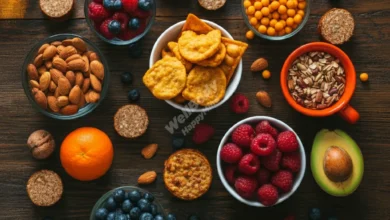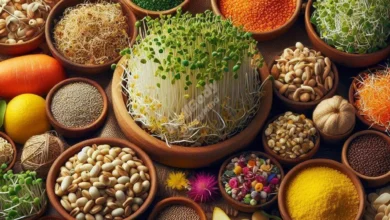Eco-Friendly Eating for Fitness: Green Plates, Healthy Weights

The Surprising Link Between Diet and Planet
Did you know that your food choices could help both your body and the Earth? A recent study found some exciting news. People who ate plant-based diets lost more weight than others. And they didn’t even count calories! This discovery shows a strong link between eco-friendly eating and fitness. It’s a trend that’s quickly growing in the health world.
What’s Eco-Friendly Eating All About?
Eco-friendly eating is simple. It’s about choosing foods that are good for you and the planet. Think of it as a way to nourish your body and the Earth at the same time. More and more people are realizing how their diet affects their health and the environment. As a result, sustainable eating is becoming a big part of many fitness plans.
The Big Impact of Small Choices
Your food choices matter more than you might think. In fact, our food system is responsible for about 26% of global greenhouse gas emissions. That’s a big number! But here’s the good news: by making smarter food choices, we can help reduce this impact.
Key Aspects of Sustainable Eating
Eating sustainably isn’t complicated. Here are some key things to focus on:
- Choose locally sourced foods
- Eat more plant-based meals
- Reduce food waste
- Pick seasonal produce
- Avoid overly processed foods
- Choose products with sustainable packaging
By keeping these points in mind, you can create a diet that’s good for you and kind to our planet. But how does this connect to fitness? Let’s explore that next.
How Green Eating Boosts Your Fitness Game
Ever wonder how your food choices affect your workout results? Let’s dive in! Sustainable food choices can give your fitness goals a real boost. Here’s how:
Whole Foods, Whole Benefits
Eco-friendly diets often focus on whole, plant-based foods. These foods are packed with nutrients that fuel your body for peak performance. They’re rich in vitamins, minerals, and antioxidants that help your body recover faster after tough workouts.
Clean Eating for Better Performance
Clean eating is a key part of sustainable diets. This means choosing foods that are minimally processed and free from artificial additives. Clean eating can lead to:
- Improved energy levels
- Better digestion
- Enhanced mental clarity
- Stronger immune system
All these benefits can help you perform better in your fitness routine and recover more quickly.
Eco-Friendly Eating: Your Weight Management Ally
Now, let’s talk about how sustainable eating can help you manage your weight. It’s not just about counting calories!
The Power of Plants
Plant-based diets, which are often more sustainable, can be great for weight management. Here’s why:
- High in Fiber: Plant foods are usually rich in fiber. Fiber helps you feel full longer, reducing overeating.
- Nutrient-Dense: Many plant foods pack a lot of nutrients with fewer calories. This means you can eat more and still maintain a healthy weight.
- Lower in Unhealthy Fats: Plant-based diets are often lower in saturated fats, which can contribute to weight gain when consumed in excess.
Mindful Eating and Sustainability
Eco-friendly eating often goes hand-in-hand with mindful eating. When you’re more aware of where your food comes from, you tend to make better choices. This mindfulness can help prevent overeating and promote a healthier relationship with food.
The Calorie Equation
Many eco-friendly food choices are naturally lower in calories. For example, fruits and vegetables have fewer calories per gram than processed foods. This means you can eat a larger volume of food while still maintaining a calorie deficit if weight loss is your goal.
By choosing sustainable, plant-based options, you’re not just helping the planet. You’re also giving your body the tools it needs to reach and maintain a healthy weight. In the next section, we’ll explore practical tips for incorporating eco-friendly eating into your fitness routine.
Making Green Eating Work for Your Fitness Routine
Ready to make your plate greener and your workouts better? Here are some practical tips to get you started:
- Plan Your Meals: Take time each week to plan your meals. This helps you avoid unhealthy, packaged foods and reduces food waste.
- Shop Local: Visit farmers’ markets or join a community-supported agriculture (CSA) program. You’ll get fresh, seasonal produce that’s often more nutritious.
- Prep in Batches: Cook large batches of whole grains, legumes, and vegetables. Store them in reusable containers for quick, healthy meals throughout the week.
- Choose Whole Foods: Opt for whole fruits, vegetables, grains, and legumes instead of processed alternatives. They’re better for you and the planet.
- Stay Hydrated Sustainably: Use a reusable water bottle instead of buying bottled water. It’s eco-friendly and keeps you hydrated for your workouts.
Eco-Friendly Pre and Post-Workout Snacks
Fuel your fitness with these sustainable snack ideas:
- Pre-workout: Apple slices with almond butter, or a homemade trail mix with nuts and dried fruits.
- Post-workout: Smoothie made with local, seasonal fruits and plant-based protein powder, or whole grain toast with mashed avocado.
Powering Up with Plant Protein
Worried about getting enough protein on an eco-friendly diet? Don’t be! There are plenty of sustainable protein sources that can support your fitness goals.
| Protein Source | Protein Content (per 100g) | Environmental Impact |
|---|---|---|
| Lentils | 9g | Low |
| Chickpeas | 19g | Low |
| Tofu | 8g | Low to Moderate |
| Quinoa | 4g | Low |
| Almonds | 21g | Moderate |
| Pea Protein | 80g | Low |
These plant-based proteins are not only good for the environment but also packed with other nutrients that support overall health and fitness.
Benefits of Plant Proteins for Fitness
- Easier Digestion: Many people find plant proteins easier to digest, which can be beneficial before and after workouts.
- Lower in Saturated Fat: Plant proteins are often lower in saturated fat compared to animal proteins, supporting heart health.
- Rich in Fiber: Unlike animal proteins, plant proteins come with fiber, which aids digestion and promotes feelings of fullness.
- Diverse Nutrient Profile: Plant proteins often come with a range of vitamins, minerals, and antioxidants that support overall health and recovery.
By incorporating these sustainable protein sources into your diet, you’re not just fueling your workouts – you’re also making a positive impact on the planet. In the next section, we’ll discuss how to balance nutrition and sustainability in your fitness journey.
Striking the Right Balance: Nutrition Meets Sustainability
While eco-friendly eating offers many benefits, it’s crucial to ensure you’re meeting all your nutritional needs. Here’s how to maintain balance:
- Variety is Key: Eat a wide range of plant-based foods to get all essential nutrients.
- Mind Your Micronutrients: Pay attention to vitamins and minerals like B12, iron, and zinc, which can be less abundant in plant-based diets.
- Supplement Wisely: Consider supplements for nutrients that may be lacking in your diet, but always consult with a healthcare professional first.
Tip: Use a food tracking app to ensure you’re meeting your nutritional needs while eating sustainably.
Eco-Friendly Eating and Athletic Performance
Contrary to old beliefs, sustainable diets can support and even enhance athletic performance. Here’s how:
- Improved Endurance: Plant-based diets are often high in complex carbohydrates, which provide sustained energy for endurance activities.
- Faster Recovery: The anti-inflammatory properties of many plant foods can aid in quicker recovery after intense workouts.
- Better Overall Health: A diet rich in fruits, vegetables, and whole grains supports overall health, which is crucial for long-term athletic success.
Success Stories
Many top athletes, like Venus Williams (tennis) and Scott Jurek (ultramarathon runner), thrive on plant-based diets. Their success demonstrates that eco-friendly eating can fuel even the highest levels of athletic performance.
Overcoming Challenges in Adopting an Eco-Friendly Diet for Fitness
Transitioning to a more sustainable diet can come with hurdles. Here are some common challenges and solutions:
- Social Situations: Bring a dish to share at gatherings, or research menu options in advance when dining out.
- Meal Prep Time: Batch cook on weekends and invest in time-saving kitchen tools like a pressure cooker.
- Protein Concerns: Educate yourself on plant-based protein sources and how to combine them for complete proteins.
Remember, it’s okay to make changes gradually. Every small step towards more sustainable eating is a win for both your health and the planet.
The Future of Eco-Friendly Eating in Fitness
The intersection of sustainability and fitness is an exciting, evolving field. Here are some trends to watch:
- Personalized Nutrition: AI-driven apps that suggest sustainable meal plans tailored to individual fitness goals.
- Sustainable Sports Supplements: Plant-based, eco-friendly alternatives to traditional sports nutrition products.
- Urban Farming Integration: Gyms and fitness centers incorporating on-site gardens for ultra-local produce.
Conclusion: Your Green Plate, Your Fit Future
Eco-friendly eating isn’t just a trend—it’s a powerful tool for achieving your fitness goals while contributing to a healthier planet. By choosing sustainable foods, you’re nourishing your body, supporting your fitness journey, and making a positive impact on the environment.
Remember, every meal is an opportunity to make a difference. Start small, be consistent, and watch as your green choices lead to a healthier you and a healthier Earth.



